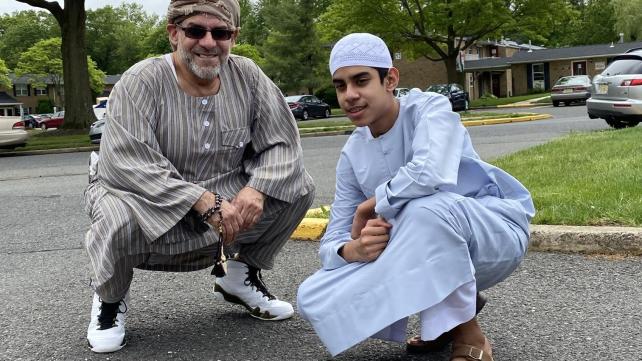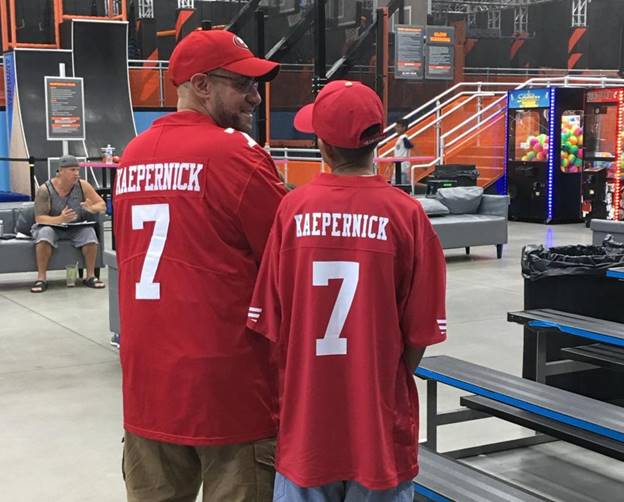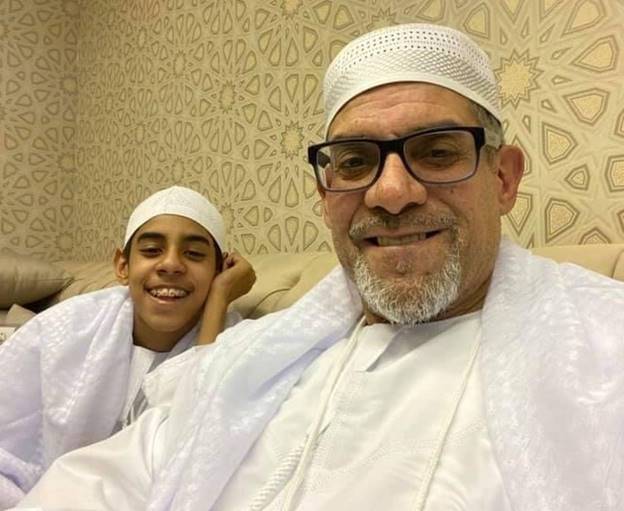
Nurturing the Father-Son Bond: An Interview with a Muslim Single Father on Parenting
By Wendy Díaz
Maryland
Over the last decade and a half in my involvement with organizing Islamic events in the Northeast, there have been two familiar faces that I consistently see in the audience. Whether the venue is in New York, New Jersey, Connecticut, or even Maryland, I can always count on this father-and-son duo to show up in support of their fellow Latino Muslim brothers and sisters.
Orlando Rosario and his son, Ali, are regular attendees at Islamic conferences, open houses, Ramadan iftars, Eid celebrations, and dawah events in the various communities I have visited. Their bond is unique, and it has caught my attention over the years because the two are inseparable, alhamdulillah, all thanks and praise to Allah. Whenever you see Orlando, Ali is faithfully by his side—sometimes even wearing matching jerseys or baseball caps. They are beloved by the members of the many Islamic centers they visit, and Ali, who is approaching eighteen years of age, has practically been raised surrounded by Muslims of all backgrounds.
In today's world, with busy schedules and overworked parents, it is rare to see a father so involved in his child's life, especially as a single dad. To celebrate this beautiful relationship and honor our dear brother, Orlando Rosario, I wanted to interview him and learn how he manages to raise a son as a single parent. However, what I learned from his answers is far more valuable than just parenting advice. His life story, even before having Ali, is an invaluable lesson that no matter where we are from or where Islam finds us, we are all capable of being good Muslims and outstanding parents.
Finding Islam in the 1970’s
Orlando Rosario, also known by his Muslim name Yunus Abdul Hakeem Mujaheed, was born in 1959 and raised in New York City's Lower East Side, specifically Alphabet City in downtown Manhattan's East Village. A first-generation Puerto Rican, his father hailed from Quebradillas, and his mother from San Sebastian, Puerto Rico. Orlando grew up amidst the turbulence of NYC’s streets during the 60s and 70s, surrounded by gangs, drugs, and other criminal activity. As a youth, he fell into delinquency, eventually leading to his incarceration at the tender age of 18. He would remain in prison until he was 36 years old. All hope seemed lost for young Orlando, but it was during his jail sentence that he would find the guidance he so desperately needed.
While incarcerated, Orlando's life took a transformative turn when a childhood friend introduced him to Islam at the age of 20 in 1979. He then devoted himself to studying the faith and pursued education during the remainder of his time in prison. Orlando emerged as a leader within the Muslim community and Latino organizations, and he immersed himself in learning about his Latino and African heritage. Although Orlando’s former lifestyle steered him to prison, it also led him to embrace Islam and find salvation in faith when he felt he “hit rock bottom.”
After he was finally released from prison in 1995, an imam and a Muslim brother picked him up from a bus station and dropped him off at his sister’s house. At this point in his journey, he said he struggled to connect with Muslims and adjust to a whole new world outside of the prison system. Around 1996 or 1997, he was able to reconnect with one of his prison teachers, Musa Abdul Khabir, who was teaching in his home in Spanish Harlem, NYC. Orlando began attending Islamic classes there with various brothers, both Latinos and African Americans. He also participated in programs at the Latino masjid, Alianza Islamica, in the Barrio in Spanish Harlem.
From 1997 to 2005, Orlando lived and worked in NYC as a Custodial Manager at the Health Science Center in Brooklyn and the Museum of Natural History. In 1998, he reunited with Imam Umar Abdul Jalil, may Allah have mercy on him, one of his original teachers from 1979, who started Masjidus Sabur on Adam Clayton Powell Blvd in Harlem. Orlando became an active member of this Masjid and continues to consider himself a member from afar, maintaining relationships with brothers and sisters he has known for 20 to 40 years. He says he still communicates with many of his brothers from prison and Harlem days, participating in family events with his son Ali over 40 years later.
Marriage, Divorce, and Parenting Muslim Children
In 2004, Orlando met Ali’s mother, Asma, a single mother of Indian descent who had two boys. They married in 2005 and moved to Mercer County, New Jersey, where they raised her two sons together before having Ali in 2006. While living in New Jersey, Orlando worked in NYC in Facilities Services and Campus Planning at the Borough of Manhattan Community College (CUNY). He was eventually promoted to Administrative Superintendent III at the CUNY Graduate Center on 34th Street, where he said he worked for about 15 years before retiring.
Married life and parenting presented new challenges. Orlando mentioned that being part of an Indo-Pakistani family was a significant learning experience, as he often felt the pressures and isolation that can come with being an outsider in large family gatherings. However, he sought solace in parenting and teaching his son about Islam.

He said, “When Ali was very young, I remember reading books to him at bedtime, like stories of the Sahabas, Sufi tales, or fun books.” Orlando and his children attended the Institute of Islamic Studies, which eventually became the Islamic Center of Greater Princeton, a Muslim community started by his wife’s family. Eventually, the family bought a house and moved to East Windsor, NJ, but after ten years of marriage, Orlando and his wife divorced. At this point, they began co-parenting Ali, and the father vowed to stay close and help raise his son and maintain a relationship with his stepsons.
Orlando continued to teach Ali about his faith, instilling in him the same lessons he learned when he first embraced Islam. In his own words, he describes his loving parenting style:
“I stayed close to Ali selling the house and moving into a condo close to Ali to help raise him. Whenever Ali was in the car with me on the way to school or just riding to different places until now, I always give him one-on-one classes on various Islamic topics. I would go out of my way not to disappoint him and was protective of him when people promised him things but let him down. I would teach Ali about good people and bad people not only in Islamic and world history but in our present time. I would take him with me to feed the homeless, and see neighborhoods where people are strung out on drugs and alcoholism in Philly, NJ, and NYC. I have taken Ali to see various shaykhs from YouTube and sit in Islamic programs on contemporary issues facing Muslims in America. I try my best to keep Ali focused and informed. I do my best not to disappoint my son and to keep my personal issues away from him. I try to keep Ali mindful of his Indian and Latino cultures and identity, teaching him that he is a Muslim young man of color in this strange society. I make sure nothing interferes with his interaction with his Indian Muslim family and keep him connected with the Latino side through visiting with his aunts, uncles, and cousins in NYC.
We recently took a trip to Puerto Rico to visit my aunt and cousins in my grandmother’s house, sharing many memories with him in Quebradillas, PR. Sometimes we may read books about Islam. I made sure Ali went to public school until the 1st grade when I eventually decided to place him into a private Islamic school. Ali has been with me almost every day since he was born, even after the divorce. I try to keep Ali grounded and focused, and I make many duas in salah and throughout my day for him to be aware of his duties and responsibilities as a Muslim young man.”

Advice to Single Parents
We all know that raising children is not devoid of difficulties. Even during times of trials and conflicts, Orlando knows how to overcome them with patience and gentle parenting. He said:
“When I come to a challenge with Ali, I try my best to school him and remind him of his Muslim responsibilities and how to make taubah or repent to Allah. There may be times he may make a mistake, but he knows that he (himself) is not a mistake and that Shaytan’s job is to make a person feel like a failure, so they stop turning to Allah. Ali understands that once you stop praying you are lost in the game of life, that prayer is our only salvation and repentance is our purification. I always want to know who Ali hangs out with and I like to meet his friends. I remind him that although I trust him, it is the company I am not aware of whom I may not trust. I make sure Ali is involved in Muslim youth programs on the days he’s supposed to be with me, and I financially support his Muslim youth group through donations. Paid programs like these will become his foundation when I am long gone. Just as I have connections to those I was raised within the Deen for close to 50 years (whom Ali has met), he will have his peers to help him along the way. In addition to that, we periodically visit his grandmother, grandfather, aunts, and uncles who have passed to remind him of our journey’s end and to make dua for them.”
A crucial part of Orlando’s successful parenting is his and his ex-wife’s “workable co-parenting understanding.” Their supportive relationship has facilitated Orlando’s efforts to remain close to his son, Ali. He has thus supplemented his Islamic studies by keeping him involved in youth programs at different Islamic centers. He even recently took his son on a life-changing umrah trip through MAS Reverts Reconnect. Now divorced and single for over 10 years, Orlando has also taken Ali to Muslim single matrimonial events. Through these experiences, he has taught Ali how to speak to a Wali, or the guardian of a single Muslim woman, and how a man should interact with a potential bride to help him understand the process of marriage in Islam. Orlando jokes that Ali has patiently remained by his side as his dad searches for a wife. He said, “He has been my chaperone for years!”
When asked about how he would advise other single fathers or single parents in general, Orlando said:
“Stay close to your children, invest in them with real-time and energy, support their Islamic endeavors, know their friends both non-Muslims and Muslim, help them understand what a good/bad friend or family member is, never close the door of mercy and forgiveness to your child, and tell them daily and constantly how much they are loved by Allah, by you, and by their family. Hug and kiss them even when they get older because sometimes, we take for granted our time with them. Apologize to them for your errors and even ask them to forgive you when you are wrong. Tough love without mercy is lost thoughtless love that puts you further away from the trust Allah has bestowed on you.”
Orlando has taught his son to appreciate the true meaning of family and friendship by embodying love and care in his relationships. He believes that Ali deeply loves his family, both Muslim and non-Muslim, and the broader Muslim community. As a Latino father, Orlando feels a sense of regret for not teaching him Spanish, especially when Ali sees him and the rest of the family conversing in the language. Additionally, although the dedicated father recognizes that his son, Ali, has a strong Islamic foundation, he thinks he may need more formal Islamic studies under a scholar to solidify his knowledge and secure his religious grounding.
Despite his worries, Orlando's journey as a Muslim single father showcases his dedication to raising a well-rounded and faithful son. His story is a testament to the power of resilience, faith, and the enduring bonds of family and community. Throughout the ups and downs, Orlando Rosario's journey as a Muslim and Latino single father serves as an inspiration to many, highlighting the strength of faith and the beauty of a parent’s unconditional love. If you attend an Islamic event and notice a father and son wearing matching baseball caps and sitting closely together, remember Brother Orlando and his son, Ali, and say a prayer for them both. Perhaps it is them or another loving Muslim father with his child.
( Wendy Díaz is a Puerto Rican Muslim writer, award-winning poet, translator, and mother of six. She is the co-founder of Hablamos Islam, a non-profit organization that produces educational resources about Islam in Spanish - hablamosislam.org. She has written, illustrated, and published over a dozen children’s books and currently lives with her family in Maryland. Follow Wendy Díaz on soci -al media @authorwendydiaz and @hablamosislam.https://www.soundvision.com/article/nurturing-the-father-son-bond-an-interview-with-a-muslim-single-father-on-parenting)
Back to Pakistanlink Homepage

